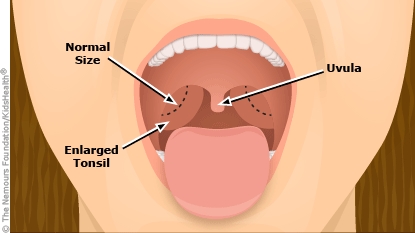Tonsils are small glands on either side of the back of the throat. They are part of the immune system and help with fighting infection. Lots of kids have enlarged tonsils, and this usually doesn't cause any harm. But if your child develops problems like snoring, poor sleep, or trouble swallowing, tell your health care provider. Treatment might help.



Your child has new signs of sleep problems, such as:

Your child has:

What causes enlarged tonsils? Having an infection caused by a virus or bacteria can make the tonsils enlarged. But they usually return to a normal size when the infection gets better. The cause of chronically enlarged tonsils isn't always known, but repeated infections may play a role. Exposure to cigarette smoke and pollution might also.
What are the signs of enlarged tonsils? If the tonsils are very large, a child may snore or have trouble swallowing certain foods. Some kids with enlarged tonsils have obstructive sleep apnea. This is when a person has pauses in breathing during sleep because the tonsils partially block the airway. A test done overnight in the hospital (a sleep study) can help health care providers see if a child has sleep apnea by looking for these pauses.
How are enlarged tonsils treated? Treatment depends on the size of the tonsils and whether they cause problems with eating, sleeping, or breathing. Most kids won't need treatment, and chronically enlarged tonsils may shrink as kids get older. But sometimes, health care providers might recommend a medicine to shrink the tonsils or surgery to remove them (a tonsillectomy). Having their tonsils removed doesn't make kids more likely to get infections. Other tissues in the body take over for the tonsils to help prevent infection.